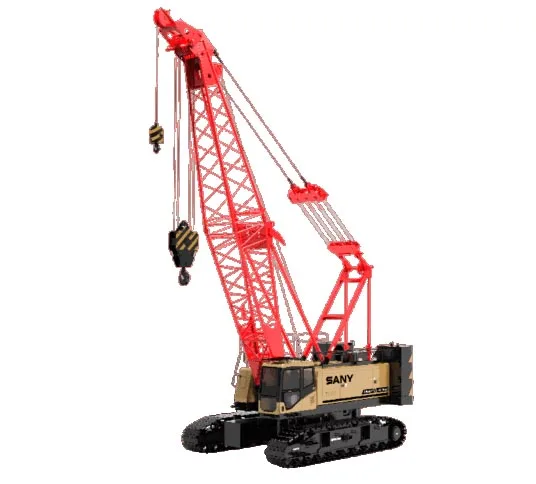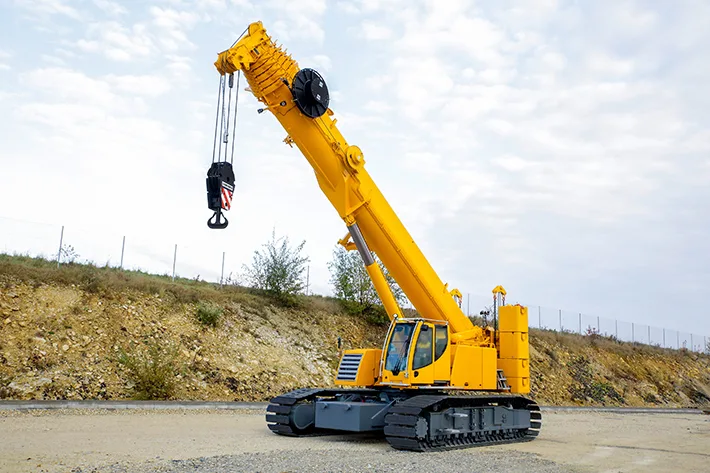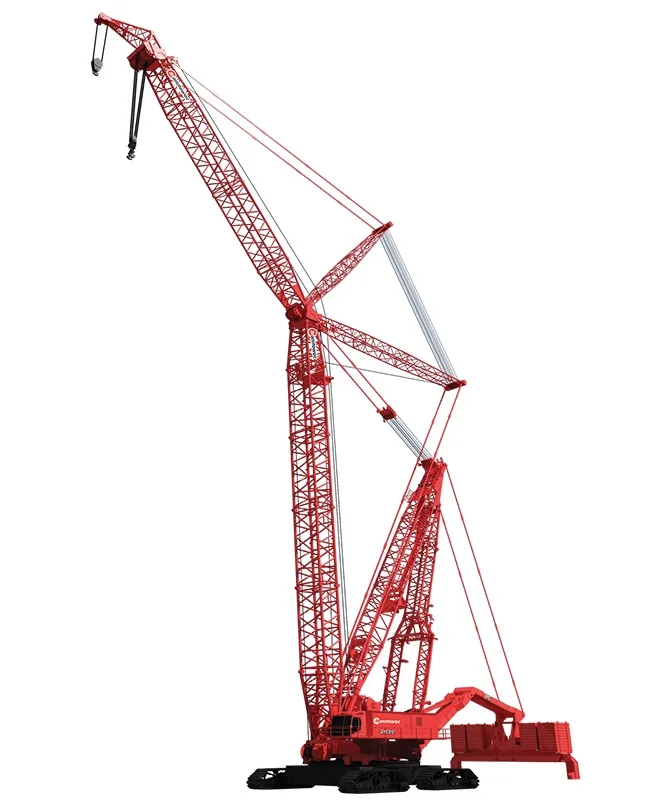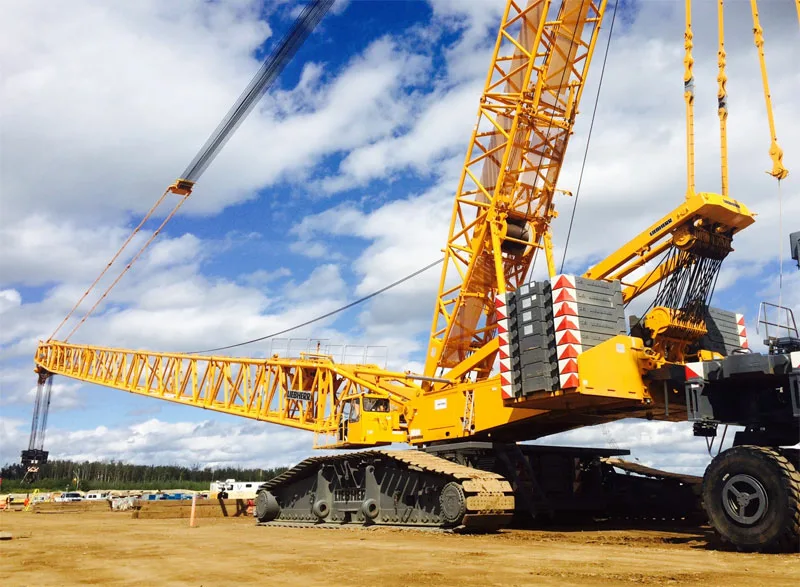A crawler crane is a specialized mobile crane designed for heavy lifting and material handling tasks. What sets them apart from other types of cranes is their distinctive undercarriage, which features a set of metal tracks. These tracks provide essential stability and enable the crane to move smoothly across various terrains, even challenging ones like soft or uneven surfaces. Equipped with various attachments and tools, these cranes are versatile machines capable of performing a wide range of tasks. They operate by utilizing hydraulic systems to extend and retract their boom arm, as well as to raise and lower the hoist. These machines find extensive use across different industries, including construction, mining, and infrastructure development. Their remarkable ability to handle substantial weights, often exceeding thousands of tons, makes them indispensable in scenarios where heavy lifting is required. Their adaptability to different job sites, coupled with their excellent lifting capacity, makes crawler cranes essential equipment for efficiently and safely tackling challenging and large-scale projects.
Demand for Crawler Cranes in India
The increasing construction activities, improvements in road networks, and growing investments in new infrastructure projects in India are expected to drive the demand for crawler cranes in the Asia Pacific region. This rising demand can be attributed to the crawler crane’s unique ability to lift extremely heavy objects in a safe and cost-effective manner. Furthermore, the market is projected to receive additional momentum from government initiatives aimed at bolstering manufacturing and enhancing infrastructure in the region. In India specifically, the demand for crawler cranes has been fueled by several factors:
- Infrastructure Development: India has made significant investments in infrastructure projects, encompassing highways, bridges, metro rail systems, and ports. Crawler cranes often play an essential role in these large-scale construction endeavors.
- Urbanization: The ongoing urbanization in India has resulted in increased demand for high-rise buildings, commercial complexes, and residential projects, all of which frequently require crawler cranes for their construction.
- Government Initiatives: Government initiatives such as “Make in India” and infrastructure development schemes have further spurred the demand for construction equipment, including crawler cranes.
- Mining and Quarrying: India’s mining and quarrying sectors rely on crawler cranes for material handling and excavation, particularly in challenging terrains.
Different types of crawler cranes
As the Indian construction sector grows, especially with the emergence of ultra-mega power projects, there’s a clear demand for higher-capacity crawler cranes. Newer models now offer smart mechanized solutions for mobile cranes, catering to various project needs. Discussed below are different types of crawler crane models used across projects.
Telescopic Twin Boom Crawler Crane for Enhanced Stability During Lifting
The latest telescopic twin boom crawler cranes come with two separate boom arms mounted on a crawler chassis, significantly improving stability and lifting capacity. This design allows precise control and versatility for a wide range of lifting and material handling tasks, making them suitable for diverse construction and industrial applications. These cranes feature unique A-frame gantry self-erection technology, eliminating the need for cylinders to achieve self-erection, thus ensuring rapid crane assembly. They require only a single counterweight, weighing no more than 5 tons, and smaller auxiliary lifting equipment can complete the counterweight assembly. These cranes offer a common platform design with a fixed jib, a single top, both-sided counterweight hook block, luffing mechanism, hydraulic pump, and main valve block, allowing for universal and interchangeable use. This approach significantly reduces procurement, transportation, and maintenance costs. The integrated design of these cranes minimizes potential failure points while reserving open space for assembly, disassembly, and maintenance purposes. They utilize a highly integrated LUDV main valve, providing a wide range of functions, including multi-complex operation, combined flow control, and high/low-speed selection, ensuring operational efficiency.

Hydraulic Crawler Crane with Advanced Safety Features
Hydraulic crawler cranes are equipped with several safety features, including a hoist safety brake, automatic swing lock, and a boom angle indicator. They can travel at speeds of up to 1.5 kilometers per hour and feature a 12-meter to 57-meter alloy steel boom, with luffing and offset angle ranges of 30 to 80 degrees and 10 to 30 degrees, respectively. The crane is equipped with pendant ropes, alloy steel connectors, and pins to secure its jib and boom. Additionally, it comes with three hook blocks of varying weights, ensuring versatility in lifting tasks. The electrical system includes two batteries, an LCD display for digital load viewing, and essential starter components. The hydraulic system consists of various motors and tanks, allowing for precise control and efficient operation. The undercarriage section is designed for easy movement, with a welded crawler side frame and H frame, and the crawler track can be adjusted using shim plates and hydraulic jacks. Hydraulic systems manage steering and crawler drive. The operator’s cabin, featuring essential accessories like rearview mirrors, control levers, and seats, is mounted on rubber pads for operator comfort. These types of crawler cranes are commonly employed in the construction of bridges, dams, and railways. We take pride in offering these cranes to our clients at affordable prices, making them an accessible choice for various lifting applications.

Lattice Boom Crawler Crane for Exceptional Lifting Capacity
Lattice boom crawler cranes are renowned in the construction industry for their exceptional performance and reliability. These cranes are equipped with robust features that make them ideal for heavy lifting tasks in various challenging environments. They often come with lattice booms, which allow for impressive lifting capacities ranging from 100 to over 3,000 tons, making them suitable for a wide range of applications, from building construction to infrastructure projects. These cranes are designed with a focus on stability, utilizing crawler tracks and well-engineered counterweight systems to maintain balance during lifting operations. Additionally, Manitowoc lattice boom crawler cranes often incorporate modern technology, such as load monitoring systems and telematics, to enhance safety and efficiency on the job site. With their combination of power, versatility, and innovative features, Manitowoc lattice boom crawler cranes are trusted assets for heavy-duty lifting needs.

Crawler Cranes with Self-Loading and Self-Assembly Systems
Crawler cranes are equipped with self-loading and self-assembly systems that allow unloading and assembly without requiring an auxiliary crane. This valuable feature enhances cost-effective transportation and expedites commissioning, ultimately boosting overall operational efficiency. These crawler cranes are designed for road transportation, boasting a compact transport width of up to 3 meters when disassembled, facilitating economical transport via standard low loaders. Furthermore, they incorporate a ground pressure visualization feature that calculates real-time ground pressure and compares it to specific safety limits, thereby enhancing safety. Another standout feature of these cranes is their versatile boom combinations. They can be configured with a maximum 92m main boom, 113m luffing jib, and various fixed jibs, including a 7m and 8m windmill fixed jib. With a 56m main boom and 113m luffing jib, these cranes can reach heights of up to 169m, setting them apart as the only 300-ton crawler cranes capable of achieving such remarkable heights. To ensure operator comfort, these cranes feature a modern air-conditioning system that improves airflow, optimizes the field of vision, and enhances noise protection. Additionally, they offer an orthopedic operator’s seat with integrated heating and cooling.

Crawler Crane with Electronically Processed Independent Controls (EPIC)
Crawler cranes now incorporate an advanced system called Electronically Processed Independent Controls (EPIC), greatly enhancing productivity and ensuring precise load control by instantly aligning the crane’s commands with its functions. EPIC employs a microprocessor that optimizes the crane’s capabilities and simplifies maintenance by pinpointing issues in the engine, power transmission, and other operational systems. Moreover, EPIC enhances versatility by enabling easy customization of a Manitowoc crane’s operations for specialized applications, whether with or without attachments. Modulating electric-over-hydraulic controls deliver infinite speed response directly proportional to control lever movements. These controls include an Electronically Processed Independent Control system utilizing CAN-BUS technology, which provides microprocessor-driven control logic, pump control, on-board diagnostics, and service information. Standard features also include block-up limit control for hoist and whip lines. This closed-loop system ensures that each crane function operates independently and with variable-speed control for the swing, load hoist, boom hoist, and travel functions. Furthermore, the crane is enclosed within an insulated galvannealed steel module, complete with sliding doors, large safety glass windows on all sides, and a roof.

Mini Crawler Crane for Confined Sites
Mini crawler cranes are compact and versatile lifting machines meticulously designed for maneuvering within confined spaces. These cranes offer an array of features that make them highly suitable for diverse applications. Their compact size is a standout attribute, enabling them to access tight areas inaccessible to larger cranes. Moreover, their outriggers allow for independent multi-angle configurations, optimizing placement in restricted or confined spaces. Rapid and straightforward installation of searcher hooks and fly jibs in the machine further enhances their working radius and lifting height. Mini crawler cranes often exhibit impressive lifting capacities relative to their size, typically ranging from 1 to 11 tons or even more. They are equipped with telescopic booms capable of reaching substantial heights while maintaining exceptional stability. Many models incorporate advanced control systems and safety mechanisms, including remote operation and load monitoring, ensuring precision and security during lifting operations.

Conclusion
Crawler cranes have become essential construction equipment in India’s rapidly growing construction and infrastructure development sector. Their ability to operate in various terrains and handle different lifting demands has made it one of the most sorted choices across projects. As the nation progresses towards urbanisation and modernization, crawler cranes will unquestionably have a crucial role in shaping India’s skyline and infrastructure for years to come.
Image Source: sanny.in, liebherr.com, manitowoc.com, schwingstetterindia.com, kobelco-in.com, fineequipment.net





